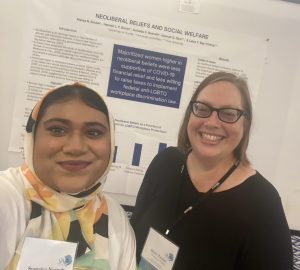Embodying and Resisting Oppression
Fusing feminist theories of embodiment with social science advances in understanding social determinants of health, my research program demonstrates that experiencing sexism contributes to negative health outcomes, with particular emphasis in the domains of sexual health and alcohol and cigarette use. Using survey and experimental research designs, I have demonstrated that when women make unhealthy decisions about their bodies, it is not a sign of frivolity or lack of education; rather, it can be an indication of the negative effects of oppression.
My research also informs resistance and community improvements. I have shown that feminist attitudes protect against internalizing oppression and engaging in harmful behavior. I currently co-direct with Maddy Coy a project examining local responses to rape—a particularly egregious manifestation of sexism. This project simultaneously aims to effect change in Alachua County, FL—increasing justice for victim-survivors—while advancing scholarly understanding of the chasm between number of rapes reported and those successfully prosecuted.
Feminist Identity and Neoliberal Ideology
My research demonstrates that developing a feminist identity, separate from feminist or egalitarian attitudes, is one powerful way to resist sexism. I have demonstrated that feminists have stronger social justice beliefs and are more willing to stand up against sexism compared to women who endorse gender equality attitudes without adopting a feminist identity.
Additionally, I collaborated with Laina Bay-Cheng and our students to build a theoretical argument, develop an empirical measure, and conduct quantitative studies to demonstrate that some people reject feminist identity because they hold a neoliberal worldview. Across this body of scholarship, I have critiqued how neoliberal ideology has infiltrated everyday citizens’ beliefs and demonstrated how such ideology prevents social mobilization.
